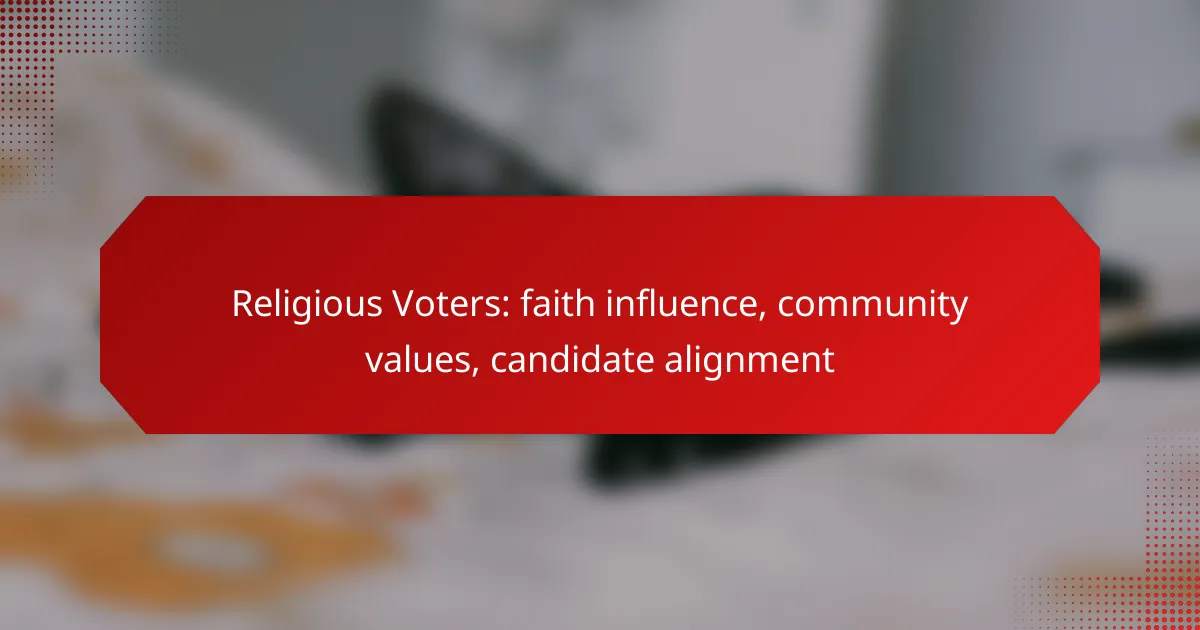Religious voters play a crucial role in shaping the political landscape in the United States, as their beliefs often guide their moral values and political priorities. By aligning their choices with candidates who reflect their faith-based principles, these voters significantly influence election outcomes. Community values further impact their voting preferences, as shared beliefs and local engagement shape their decisions and expectations from political candidates.
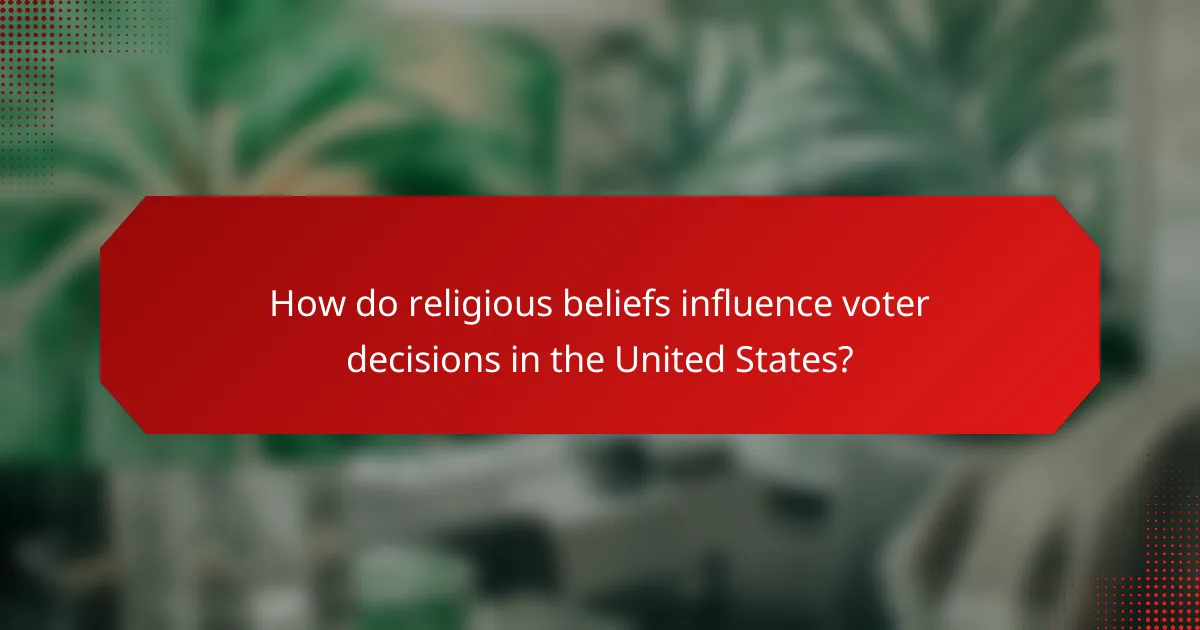
How do religious beliefs influence voter decisions in the United States?
Religious beliefs significantly shape voter decisions in the United States by guiding moral values and political priorities. Many voters align their choices with candidates who reflect their faith-based principles, impacting election outcomes across various levels of government.
Faith-based values drive candidate preferences
Voters often prioritize candidates who share their religious values, viewing them as more trustworthy and aligned with their beliefs. For instance, evangelical Christians may support candidates advocating for policies that resonate with their views on family, education, and social issues.
This alignment can lead to strong voter mobilization within religious communities, where congregational leaders may encourage participation in elections based on shared values. Consequently, candidates who actively engage with these communities often gain a significant advantage.
Religious teachings shape political priorities
Religious teachings provide a framework for understanding political issues, influencing how voters prioritize topics such as healthcare, immigration, and social justice. For example, many religious groups advocate for compassionate policies towards the marginalized, which can affect voter support for welfare programs.
Moreover, voters may interpret political issues through the lens of their faith, leading to unique perspectives on contentious topics. Understanding these teachings can help candidates tailor their messages to resonate more effectively with religious voters, enhancing their appeal in competitive elections.
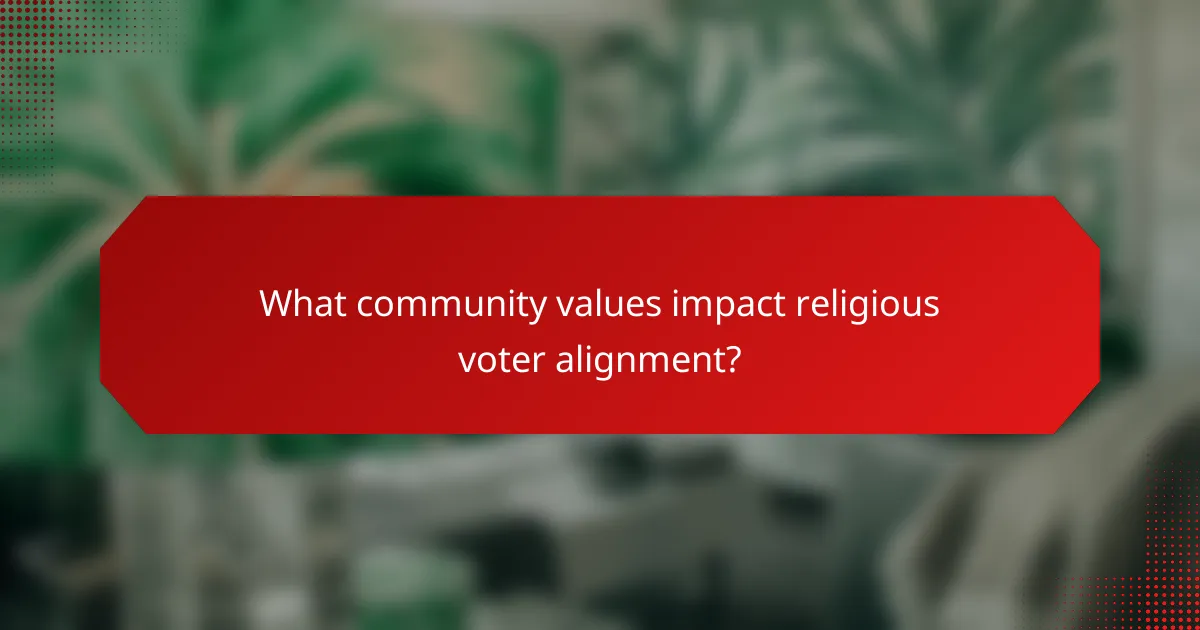
What community values impact religious voter alignment?
Community values significantly influence how religious voters align with political candidates. Factors such as shared beliefs, moral principles, and local engagement shape their voting preferences and decisions.
Shared moral principles guide voting behavior
Religious voters often prioritize candidates who reflect their moral values, such as family, integrity, and social justice. These shared principles create a framework for evaluating political platforms and policies, leading to a stronger alignment with candidates who advocate for similar beliefs.
For example, issues like abortion, marriage equality, and education policies are frequently viewed through the lens of religious teachings. Voters may support candidates who take a stance that aligns with their faith, even if it means sacrificing other political interests.
Community engagement fosters political activism
Active participation in community events and organizations enhances political engagement among religious voters. Churches and faith-based groups often serve as platforms for discussing political issues, mobilizing voters, and organizing outreach efforts.
Engagement can take various forms, including voter registration drives, community forums, and advocacy campaigns. These activities not only raise awareness about political matters but also strengthen the sense of community, encouraging individuals to vote in alignment with their shared values.
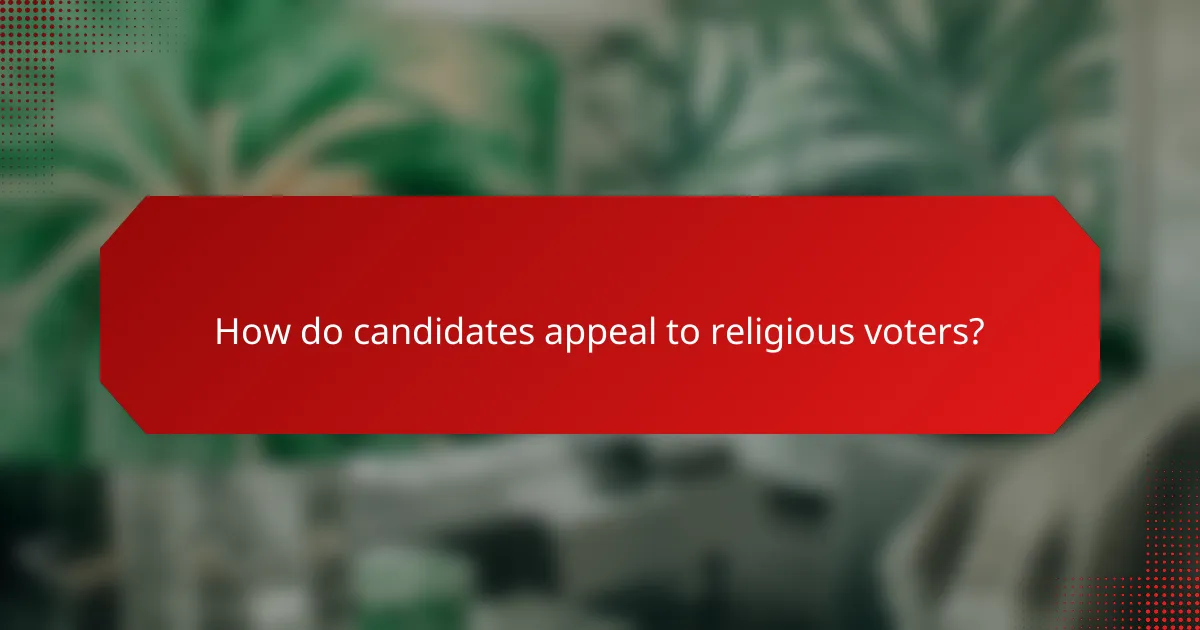
How do candidates appeal to religious voters?
Candidates appeal to religious voters by aligning their messages with faith-based values and demonstrating a commitment to community principles. This involves addressing key issues that resonate with these voters and actively engaging in their communities.
Campaign messaging focused on faith issues
Effective campaign messaging for religious voters often highlights issues such as family values, social justice, and moral integrity. Candidates should articulate their positions on topics like education, healthcare, and poverty through a lens that reflects religious teachings and community ethics.
Using specific language that resonates with faith communities can enhance a candidate’s appeal. For instance, referencing biblical principles or moral imperatives can create a strong connection with voters who prioritize their faith in decision-making.
Participation in religious events to build rapport
Attending religious events, such as services, community gatherings, and charity functions, allows candidates to build personal relationships with voters. This face-to-face interaction fosters trust and shows genuine interest in the community’s values and concerns.
Candidates should consider participating in interfaith dialogues or community service projects to demonstrate their commitment to the community. Engaging with diverse religious groups can broaden their appeal and showcase a willingness to listen and collaborate across different faiths.
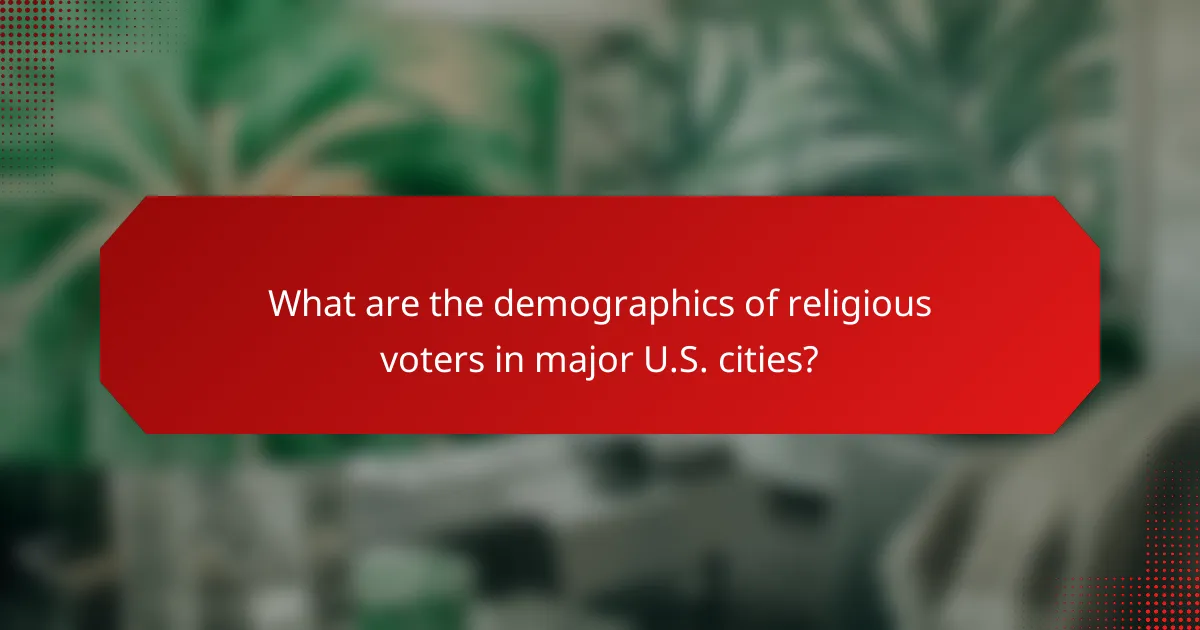
What are the demographics of religious voters in major U.S. cities?
Religious voters in major U.S. cities represent a diverse demographic, often influenced by their faith, community values, and alignment with candidates. These voters can significantly impact election outcomes, particularly in urban areas where faith-based communities are prominent.
Predominant faith groups in urban areas
In major U.S. cities, predominant faith groups include Christians, Jews, Muslims, and Buddhists, with Christianity being the largest segment. Within Christianity, various denominations such as Catholicism, Protestantism, and Evangelicalism play distinct roles in shaping voter preferences and community engagement.
Additionally, the presence of interfaith communities is growing, reflecting the multicultural landscape of urban areas. This diversity can lead to a range of political priorities, as different faith groups advocate for issues aligned with their beliefs, such as social justice, immigration reform, and healthcare access.
Age and socioeconomic factors influencing turnout
Age and socioeconomic status are critical factors affecting the turnout of religious voters. Generally, older individuals tend to vote at higher rates than younger voters, with many older religious voters prioritizing issues like healthcare and social security that resonate with their life experiences.
Socioeconomic factors, including income and education levels, also play a significant role. Higher income and education levels often correlate with increased voter engagement, as these individuals may have more resources and awareness of the electoral process. Urban areas with diverse economic backgrounds may see varying levels of turnout based on these factors, influencing overall election dynamics.
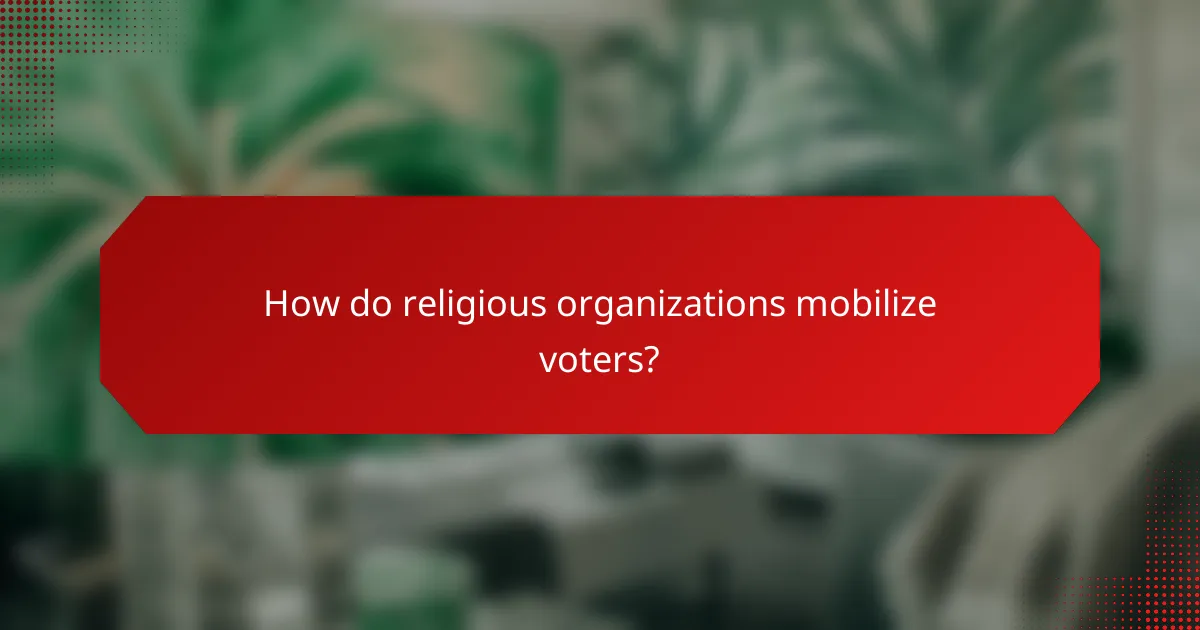
How do religious organizations mobilize voters?
Religious organizations mobilize voters by leveraging their community influence and shared values to encourage civic participation. They often engage in activities such as voter registration drives and advocacy efforts that align political candidates with their faith-based principles.
Voter registration drives by churches
Churches frequently organize voter registration drives to increase electoral participation among their congregants. These events can take place during services or community gatherings, making it convenient for members to register and learn about upcoming elections.
In many cases, churches partner with local election offices to ensure that the registration process is smooth and compliant with regulations. This collaboration helps to educate voters about deadlines and requirements, fostering a more informed electorate.
Faith-based advocacy groups influencing elections
Faith-based advocacy groups play a crucial role in shaping electoral outcomes by promoting candidates who align with their moral and ethical values. These organizations often mobilize their members to support specific issues, such as social justice, education, or healthcare, which resonate with their beliefs.
These groups may engage in activities like organizing rallies, distributing informational materials, or conducting phone banking to encourage voter turnout. By framing political issues through a faith lens, they aim to motivate voters to consider how their beliefs intersect with their political choices.

What role does social media play in engaging religious voters?
Social media significantly influences how religious voters engage with political candidates and issues. Platforms like Facebook and Instagram allow for targeted messaging that resonates with faith-based communities, shaping their political preferences and mobilizing them for action.
Targeted campaigns on platforms like Facebook
Targeted campaigns on Facebook leverage user data to reach specific religious demographics effectively. Advertisers can create tailored messages that align with the values and beliefs of these communities, increasing the likelihood of engagement and support.
For example, a campaign focused on family values might use imagery and language that resonates with Christian voters, highlighting policies that protect family structures. This approach can lead to higher turnout rates among religious voters during elections.
Influencers shaping faith-based political discourse
Influencers play a crucial role in shaping the political discourse among religious voters by using their platforms to discuss faith-related issues. These individuals often have established credibility within their communities, making their endorsements and opinions particularly impactful.
Religious influencers might share content that aligns political candidates with faith-based values, encouraging their followers to consider these candidates in light of their beliefs. This can create a ripple effect, as followers engage with and share this content within their own networks, amplifying the message.
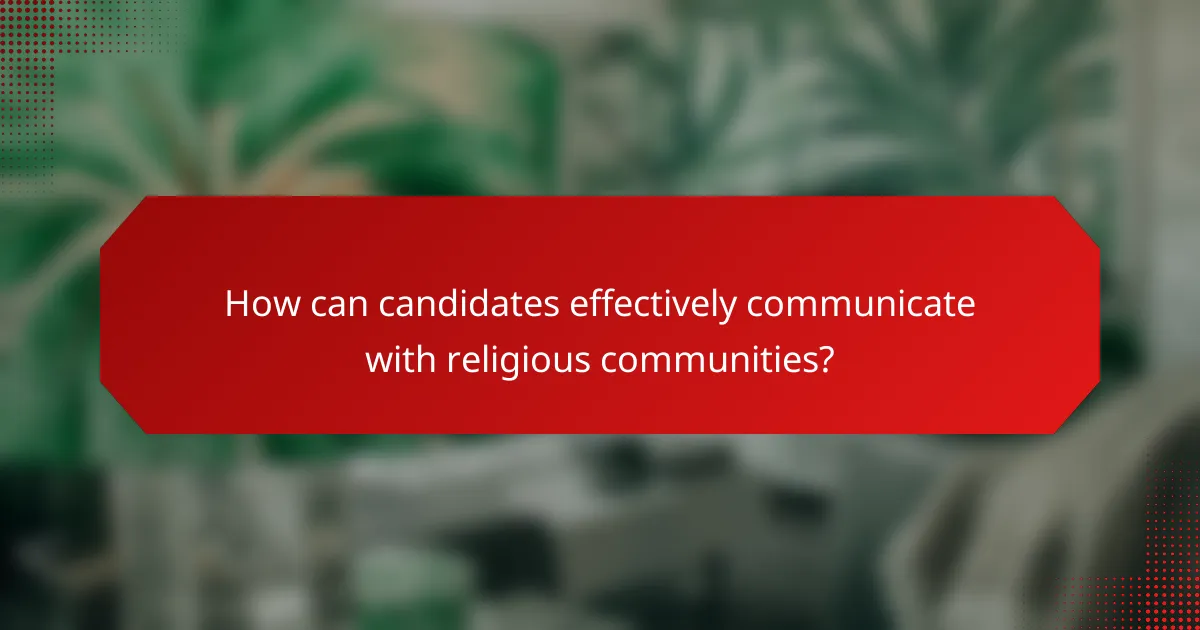
How can candidates effectively communicate with religious communities?
Candidates can effectively communicate with religious communities by understanding their values and beliefs, and aligning their messages accordingly. This involves engaging in meaningful dialogue and demonstrating respect for the community’s traditions and practices.
Understanding local religious practices
To connect with religious communities, candidates must first understand the specific practices and beliefs that shape those communities. This includes recognizing key rituals, holidays, and values that are important to them. For instance, a candidate might acknowledge the significance of Ramadan for Muslim voters or the importance of Sunday services for Christian communities.
Engaging with local religious leaders can provide valuable insights into these practices. Attending community events or services can also help candidates demonstrate their commitment to understanding and respecting the community’s faith.
Building trust through transparency and dialogue
Trust is essential for effective communication with religious communities. Candidates should prioritize transparency in their policies and intentions, clearly articulating how their plans align with the community’s values. This can be achieved through open forums, town hall meetings, or one-on-one conversations with community members.
Encouraging dialogue allows candidates to address concerns and answer questions directly. It is crucial to listen actively and respond thoughtfully, showing genuine interest in the community’s perspectives. Avoiding jargon and being straightforward in communication can further enhance trust and rapport.

What are the emerging trends in religious voter behavior?
Emerging trends in religious voter behavior indicate a growing alignment between faith and political choices, influenced by community values and candidate positions. Voters increasingly prioritize issues that resonate with their beliefs, leading to shifts in electoral outcomes.
Faith influence on voting decisions
Faith plays a significant role in shaping voting decisions, as many religious voters seek candidates who reflect their moral and ethical values. Issues such as abortion, marriage, and social justice often dominate their considerations, with candidates’ stances on these topics heavily influencing voter support.
For example, evangelical Christians in the United States have shown a strong preference for candidates who advocate for traditional family values. This trend suggests that religious beliefs can directly impact political alignment and voter turnout.
Community values and their impact
Community values significantly affect religious voter behavior, as individuals often look to their local congregations and social networks for guidance. These community influences can lead to a collective voting pattern, where shared beliefs drive group decisions during elections.
In many cases, religious leaders play a pivotal role in mobilizing voters by addressing key issues from the pulpit. This communal approach can enhance voter engagement and increase turnout, especially in tight races.
Candidate alignment with religious beliefs
Candidate alignment with religious beliefs is crucial for gaining the support of religious voters. Candidates who openly express their faith and demonstrate a commitment to religious values often resonate more with these voters, leading to stronger electoral support.
For instance, candidates who participate in faith-based events or engage with religious communities may find themselves more favorably viewed by voters. Understanding the specific beliefs and values of a religious demographic can help candidates tailor their messages effectively.
